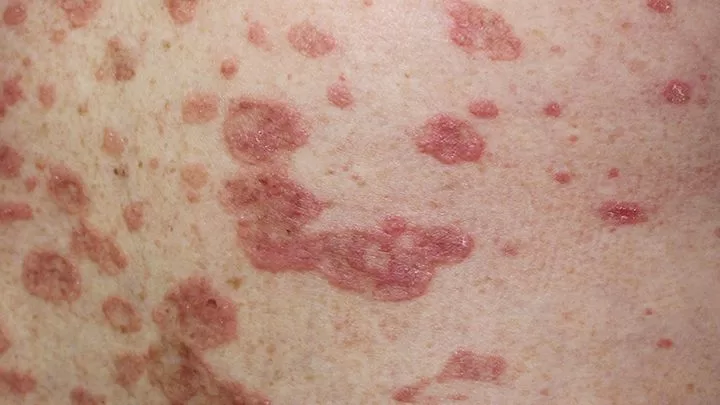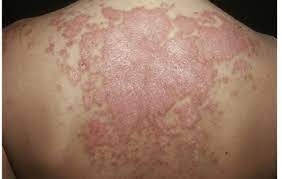Simply put, lupus is the common name for systemic lupus erythematosus (SLE), a chronic autoimmune disease that can lead to pain and inflammation all over the body. Autoimmune diseases are caused when the immune system attacks healthy tissue in a way that does more harm than good. The immune system normally protects the body from foreign invaders like viruses and bacteria, but in this case, it mistakenly attacks healthy tissue.
Lupus is characterized by a wide range of symptoms, including joint pain, sensitivity, rashes on the skin, and even organ dysfunction (brain, lungs, kidneys, and heart). It’s possible that these symptoms will come and go in waves, also known as flare-ups. Lupus can go into remission, a state in which symptoms are minimal or nonexistent. Sometimes, the symptoms of the condition can be so bad that they make it hard to do normal things.
What are the various types of lupus to be diagnosed?
Several distinct forms of lupus have been identified. The most prevalent form is SLE or systemic lupus erythematosus. Additional Lupus Subtypes
Cutaneous lupus erythematosus
The skin is affected by the form of lupus known as cutaneous lupus erythematosus. People with cutaneous lupus erythematosus often have skin problems, like being sensitive to the sun and getting rashes. This condition often manifests itself in the form of hair loss.
Lupus brought on by medication
This condition is known as “drug-induced lupus.” People with drug-induced lupus can have many symptoms as those with systemic lupus erythematosus, but this condition usually only lasts a short time. This form of lupus typically disappears once the offending drug is no longer taken.
Neonatal lupus
One of the rarest forms of the disease, neonatal lupus, manifests in newborns. Babies with neonatal lupus have antibodies that were passed down from their mothers, who either had lupus during pregnancy or are at risk of developing the disease in the future. While some infants of lupus-stricken mothers do develop the disease, that is not always the case.

Whom does lupus strike?
Lupus is not selective. It is possible for anyone, including pregnant women, men, children, and even newborns, to contract this illness. Around 90% of diagnosed cases are in women of reproductive age, making it much more common in women than men. Because lupus can be hard to diagnose, it’s hard for experts to estimate the prevalence of the disease in the United States.
Multiple other diseases and conditions can exhibit symptoms similar to those of lupus. This means that some people with lupus may never receive a diagnosis, potentially affecting their health for the rest of their lives.
Some groups of people are also disproportionately affected by lupus. Women of color (African-American, Hispanic, Asian, and Native American) are at a higher risk of developing the condition. You are also more likely to get lupus if a close family member has it or another autoimmune disease.
Is there a gender disparity in the prevalence of lupus?
Nine out of every 10 people diagnosed with lupus are women. Most diagnoses occur between the ages of 15 and 44 when a woman is likely to have children. Lupus has no known cause, but some researchers believe estrogen may play a role.
What does lupus rash look like?
Lupus is characterized by a wide variety of symptoms, and a rash is one of the most common. Lupus rashes are often caused by overexposure to the sun and can last for several days or weeks. A rash can appear anywhere on your body, including your face, hands, and wrists. In most cases, a rash that starts on the face will spread across the nose bridge and onto both cheeks. Since it takes the form of a butterfly across your face, this condition is frequently referred to by that name.
The rash usually causes the skin to feel like it’s burning and itching in a rough way. The itching and redness of these rashes may go away on their own after a while. However, some skin sores and rashes are not temporary.
In what ways does lupus affect the human body?
Different systems in the body may be affected by lupus. Besides the usual aches and pains, it can also cause serious problems with your organs. As an autoimmune disorder, lupus makes your body turn on itself. In the long run, this can cause organ failure. The skin, blood, joints, kidneys, brain, heart, and lungs are just some of the organs lupus can affect.
Skin
Skin problems are a common symptom of Lupus. Lupus patients sometimes break out in a red rash across their cheeks and the bridge of their nose. Lupus, which means “wolf” in Latin, was given to these cells a long time ago because the rash’s location is identical to the common markings of a wolf.
Large, red, circular rashes (plaques) that can leave scars are another possible skin issue (called discoid lupus). Exposure to sunlight often aggravates skin rashes. Symptoms can include thinning hair and mouth ulcers.
Blood
Involvement of the blood can occur with or without the presence of other symptoms. Red blood cells, white blood cells, and platelet counts may drop to dangerously low levels in people with lupus (cells that help clot the blood). Low red blood cell count (anemia), low white blood cell count (serious infection), and low platelet count (easy bruising) are all symptoms of abnormal blood counts (low platelet count). Although some people may experience symptoms, many people with blood abnormalities will experience none at all.
People with Lupus are more likely to develop blood clots. Deep venous thrombosis is the medical term for clots that form in the veins of the legs. The medical term for clots that form in the lungs (stroke) is pulmonary emboli. Some evidence suggests that people with lupus who have antiphospholipid antibodies are more likely to get blood clots. Antibodies are proteins that are not normal and may make the body more likely to clot.
Joints
Lupus sufferers frequently experience arthritis. Pain with or without swelling is possible. The morning hours can be particularly trying for those who experience morning stiffness and pain. Arthritis can be a short-term problem that lasts a few days to a few weeks, or it can be a long-term problem that doesn’t go away. Arthritis, thankfully, rarely causes severe disability.
Kidneys
Up to half of people with lupus may have problems with their kidneys, which can be very dangerous. When a person with lupus feels tired, has joint pain, a rash, a high fever, and loses their appetite, it could be a sign of a problem with their kidneys. Even if you don’t have any other lupus symptoms, you can still get kidney disease. Symptoms of kidney disease typically don’t present themselves until the disease is well advanced.
Diagnosing kidney disease early and effectively treating it is crucial. A urinalysis can reveal the earliest stages of kidney disease.
Brain
Fortunately, lupus patients rarely experience brain involvement. Some of the things that could happen if you have this condition are brain fog, depression, seizures, and even a stroke.
Heart and Lungs
Inflammation of the pericardium (the sac that surrounds the heart) and the alveoli (the sacs that surround the lungs) are common causes of heart and lung involvement (pleura). Inflammation of these structures (pericarditis) can cause chest pain, an irregular heartbeat, and fluid to build up around the lungs, which is called pleuritis or pleurisy.
When did lupus begin, and what causes it?
To date, researchers have been unable to identify what triggers lupus. The underlying causes of lupus are still a mystery, but scientists are working hard to uncover them. Even though there isn’t agreement on a single cause, it’s possible that a number of different factors led to this condition. Some of the things that might trigger lupus are:
Hormonal Differences
Estrogen and other female hormones may make women more likely to get lupus than men. Women’s lupus rates tend to be higher during their reproductive years (between 15 and 44), while their estrogen levels tend to be higher.
Environmental factors
Aspects of the natural world: Some things in the environment can also make the chance of getting lupus higher. Some of the many things that can cause lupus are getting too much sun, taking certain medications, getting certain viruses, or even being stressed out. Lupus risk factors include a personal or family history of smoking cigarettes.
Your etiology
Lupus may have a familial component. Your risk of developing lupus increases if a close relative already has the condition.
If you have lupus, how do you feel?
If you suffer from lupus, you may feel any one of a wide range of symptoms. The symptoms of lupus vary from person to person. This list of symptoms and the symptoms of many other diseases and disorders have a lot in common. This is a challenge that medical professionals face when trying to diagnose lupus.
Lupus symptoms may take time to show up. Over time, you might start to experience different symptoms. Even the intensity of your symptoms can fluctuate over time. The severity of your symptoms and how often they manifest can vary greatly from day to day. In medical terms, a “flare-up” occurs when the severity of a symptom increases unexpectedly.
Lupus symptoms may include:
- Pain in the Joints
- Muscles pain.
- Rashes.
- Fever.
- Intolerance to light.
- Loss of hair.
- Having sores in the mouth.
- Issues related to the respiratory system.
- Seizures.
- Depression.
- Fatigue.
- hurting chest.
- distress in the tummy.
- Difficulty in breathing.
- A condition characterized by enlarged glands.
- Dry eyes condition
- Headaches.
- Confusion.
- Raynaud’s disease
- Diseases of the urinary tract,
- Problems of the cardiovascular system, A clot forms in the blood.
- Anemia.
How does lupus manifest itself in women?
The vast majority of lupus patients are female. Lupus affects women the same way it affects men, but they may also have extra symptoms and problems. Among these issues are osteoporosis, heart disease, and kidney failure (which affects women of color and Latinas disproportionately).
How does one determine whether or not a patient has lupus?
Lupus diagnosis can be a time-consuming and laborious process. People may mistake the signs and symptoms of lupus for those of other diseases or conditions, like diabetes or arthritis. Lupus symptoms may be slow to appear, which further complicates the disease’s diagnosis.
Checking for a family history of lupus is often the first step. People may mistake the signs and symptoms of lupus for those of other diseases or conditions, like diabetes or arthritis. The doctor will likely run some tests in the lab after interviewing you about your symptoms. A low white blood cell count, anemia, and other abnormalities are among the things checked for by these tests.
Antinuclear antibody (ANA) testing is another option that the doctor might explore. In this test, antibodies are looked at because they could be a sign of an autoimmune disease. As a rule, ANAs will be present in the blood of a person with systemic lupus erythematosus.

Some of the medications used to treat lupus are:
Steroids
People with rashes can put steroid creams (corticosteroids like Prednisone) directly on the spots that are itchy. m is generally safe and effective, particularly for mild rashes. For mild to moderate lupus symptoms, low-dose steroid creams or pills may be helpful. When the body’s internal organs are in danger, steroids can be given in much higher doses. Consequences tend to be most common at higher doses, which is unfortunate.
Hydroxychloroquine
Medications like hydroxychloroquine are often given to help deal with mild lupus problems like skin and joint disease. It’s also effective against tiredness and ulcers in the mouth.
Azathioprine
Azathioprine, a drug that was originally made to prevent organ transplant rejection, is often given to people with severe lupus.
Methotrexate
Another chemotherapy drug used to dampen the immune system is methotrexate. It is gaining popularity for the treatment of skin conditions, arthritis, and other non-life-threatening diseases that have not responded to less potent drugs like hydroxychloroquine or low doses of prednisone.
Immunosuppressants
Both mycophenolate mofetil and cyclophosphamide are powerful immunosuppressants that are used as chemotherapy drugs. They are used to treat lupus, which affects the kidneys, and other severe forms of the disease.
Belimumab
Belimumab is a monoclonal antibody that stops lymphocytes, which are a type of white blood cell that make autoantibodies, from working. Tissue damage is an important effect of autoantibodies. Belimumab is used to treat patients who have not responded to other treatments for lupus that do not affect the kidneys.
Rituximab is another monoclonal antibody that stops lymphocytes, which are the white blood cells that make autoantibodies, from working. When other treatments have failed, they may be tried for lupus patients.
In more severe complications (like heart, lung, or kidney complications). Your doctor will figure out the best way to treat you based on your symptoms, any complications, and your medical history.
Is there a treatment for lupus?
The autoimmune disease lupus has no known treatment options at the moment. Lupus treatment centers on symptom management and reducing the disease’s impact on the body. Lupus is always there, but it can be managed to make it less of a problem in everyday life.
How definitive is a positive antinuclear antibody (ANA) test result in diagnosing lupus?
Simply having a positive antinuclear antibody test does not confirm a diagnosis of lupus. Most lupus sufferers will test positive for ANA, but many healthy people will also have positive results. For this reason, having a positive ANA isn’t sufficient for making a lupus diagnosis. The presence of lupus is only one of the clinical features your doctor will look for; symptoms and family history are the other two.
Exactly how does one go about treating lupus?
Different factors may influence how your doctor treats your lupus, such as:
- The signs and symptoms, as well as the problems, that you are currently experiencing.
- The seriousness of your situation
- Your age.
- The kind of medication that you might be taking at this time.
- Your state of health in general.
- The details of your medical history.
Because of the chronic nature of lupus, it requires ongoing treatment. The goal of treatment is to get rid of or greatly reduce the patient’s symptoms and slow or stop organ damage from getting worse. The effects of lupus can vary from one person to the next and even over the course of a lifetime. Your symptoms will determine how often you need to see your doctor and how often your treatment plan needs to be changed.
People with lupus who only exhibit mild symptoms may only need minimal treatment. These people are being observed to make sure their symptoms don’t worsen, but they don’t require treatment right now. In some cases, a more robust approach to therapy may be required. These people typically experience
Some common doubts regarding Lupus
Can lupus cause death?
Lupus probably won’t be the direct cause of death, but the symptoms and organ failures that go along with it could be. Chronic kidney disease, cardiovascular disease, and infections are all potentially fatal health conditions.
Does lupus affect pregnancy?
Pregnancy is possible for women with lupus. Although patients with lupus have a lower likelihood of developing lupus, they do have a higher risk of having an unfavorable pregnancy result (miscarriage). Schedule a preconception appointment with your doctor if you’re thinking about getting pregnant in the near future. Your lupus treatment plan may need to be modified by your doctor to make sure it’s safe for you to conceive while taking the drugs.
Is there a chance of passing lupus on to offspring?
Lupus may have a familial component. If you have a history of lupus in your family, you are more likely to develop the disease. It is possible for a mother to pass on her lupus to her child. That said, it’s not common for this to occur. Women with lupus have an increased risk of having a child who also has the disease. It’s important to discuss your plans for pregnancy with your doctor if you have a history of lupus in your family or if you have lupus yourself.
Is there a connection between lupus and hair loss, and if so, what could it be?
Lupus can cause damage to the skin and cause hair loss. As a result of rashes, people with Lupus may get scars on their skin and scalp. This can lead to thinning and eventual loss of hair. Some medications used to treat lupus, particularly steroids, can cause hair loss in some people. Consult your doctor if you notice your hair is thinning or falling out. Medication changes can be helpful in these cases. To avoid irritation, your doctor may also suggest mild shampoos (baby shampoo).
What factors in lupus contribute to either weight gain or loss?
Lupus patients may lose weight for a variety of reasons. This may result from the side effects of the drugs used to treat lupus, or it may be an effect of the distress brought on by the condition itself. But on the flip side, if joint pain prevents you from being as active as you’d like, you might put on weight. For those who suffer from lupus, eating well is crucial. If you want to know what diet is best for you, it’s best to talk to your doctor and maybe even a nutritionist.

When a flare-up of my lupus occurs, what should I do to alleviate the pain?
Even though you can’t avoid getting lupus, you can reduce flare-ups of its symptoms by making simple changes to your lifestyle. The following are some options to try:
For many people with lupus, sun exposure is a problem and should be avoided. If you must go outside while the sun is out, try to avoid doing so during its peak hours, dress appropriately (long sleeves, brimmed hat), and use sunscreen.
Disclaimer:
This information is for educational purposes only, and no medical advice should be inferred from it. Before changing your diet or adding supplements, please talk to your doctor.
The author’s views are his or her own. The facts and opinions in the article have been taken from various articles and commentaries available in the online media and Eastside Writers does not take any responsibility or obligation for them.
Note: Contact our Writers at www.eastsidewriters.com for writing Blogs/Articles on any niche. We have experts in various domains from Technology to Finance and from Spirituality to Lifestyle and Entertainment.






